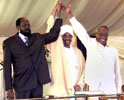
After months of deadlock over the appointment of the secretary general for the South Sudan Referendum Commission, the SPLM has conceded—under significant pressure to reignite a referendum process that is desperately behind—to what is largely viewed as an NCP nomination for the position, announcing Monday that it would allow a northerner to take the post.
“The secretary general is not the issue – having the referendum on time is," said one of SPLM’s main negotiators and senior members Yasir Arman. "There’s a deputy secretary general so he can be a southerner."
For weeks the commission was divided along North-South lines over nominations for the secretary general position. Commission head Mohamed Ibrahim Khalil publicly criticized the southern members of the commission last week, accusing them of obstructing the process by voting as a bloc to prevent any northerners from taking the post. The SPLM voiced concern about Khalil’s ability to act as an honest broker and in a statement said that the NCP is to blame for lack of preparation for the pivotal vote. According to international sources close to the negotiations, Khalil refused to accept that the nominations were rejected, despite the five southern members’ right to veto as a majority.
The SPLM political bureau took up the issue of the deadlock at a meeting two weeks ago, and then the referendum commission pushed the decision up to President Omar al-Bashir, First Vice President Salva Kiir, and Second Vice President Ali Osman Taha this past weekend. Omer al-Sheik, one of the northern candidates originally proposed, is expected to take the post.
While resolution to the appointment will finally allow preparations to proceed, the SPLM’s concession offers worrying indications of how critical issues (appointment of the Abyei referendum commission chair being a pressing one) may be resolved in the future. With just over four months left before the two referenda, the SPLM will increasingly find itself choosing between meeting the inviolable deadline of January 9, 2011 or standing its ground on key decisions that will affect how the votes are managed, and may even affect the results. The way in which the secretary general controversy played out shows that the southern ruling party, disadvantaged by the lack of time, can be forced into compromises.
The secretary general debate also demonstrates that, regardless of established legal processes, critical issues will be resolved at the political level, among the political elite. These dynamics have created a polarized and opaque environment where debate over a single position was able to hold up the entire referendum preparations for months. In the absence of international mediation, the likelihood of credible votes in January seems increasingly unlikely.
"When two people are engaged in something and do not understand themselves any longer, they invite an independent person to assist. This was how the current peace agreement was reached. It was reached through mediation and assistances from independent bodies,” said senior member of the SPLM Chol Deng Alaak.
Alaak for one is calling for international intervention in the impasse over the Abyei referendum chair, an issue that is considerably more controversial than the secretary general disagreement and has stalled the formation of the Abyei referendum commission for eight long months. International actors would do well to answer his call.
Photo: Sudan President Omar al-Bashir, First Vice President Salva Kiir, and Second Vice President Ali Osman Taha (AP)

